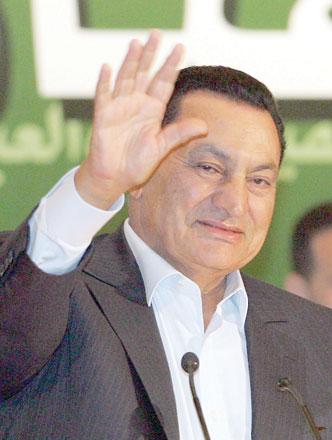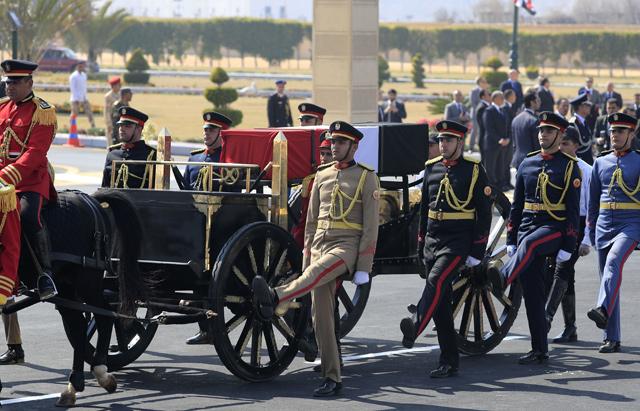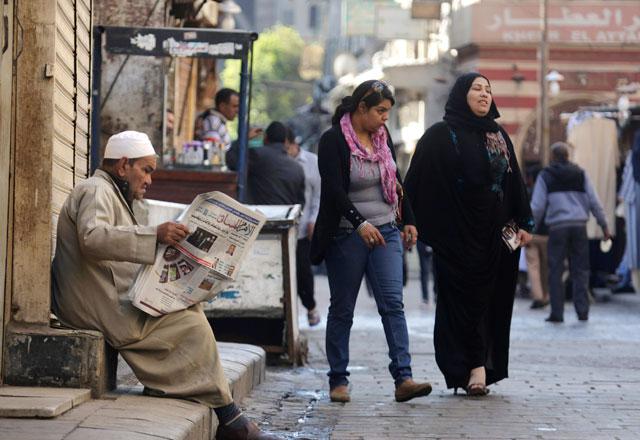You are here
Egypt's ex-president Hosni Mubarak died at 91
By AFP - Feb 25,2020 - Last updated at Feb 25,2020

This file photo taken on September 3, 2005 shows Egyptian president and National Democratic Party candidate for the upcoming presidential election, Hosni Mubarak, waving to supporters at a rally in Alexandria (AFP photo)
CAIRO — Egypt's former president Hosni Mubarak, who ruled for three decades before he was ousted amid the Arab Spring protests in 2011, died Tuesday at age 91.
The once burly leader with the trademark sunglasses, who became witheringly frail after multiple surgeries towards the end of his life, spent years behind bars for his role in the deaths of protesters but was freed in 2017 after the convictions were overturned.
His son Alaa Mubarak wrote on Twitter: "This morning my father, president Mubarak, passed away".
His death was confirmed by the presidency and on state television.
Mubarak's brother-in-law, General Mounir Thabet, told AFP that the family was by Mubarak's side at the hospital.
A military funeral is planned for Wednesday, to be followed by three days of mourning, said the office of President Abdel-Fattah Al Sisi.
Mubarak had long battled illness and was recently admitted to a Cairo military hospital's intensive care unit, as media speculated on whether he suffered cancer, heart troubles or respiratory ailments.
Tributes poured in from leaders in the Middle East, where Mubarak's Egypt, a key ally of the United States, had at times served as a mediator, especially in the Israeli-Palestinian conflict.
Palestinian President Mahmoud Abbas said he mourned the death "with great sorrow" and hailed Mubarak's support of the Palestinian cause.
The long-time president started off as a military pilot and was commander of the air force in the 1973 war with Israel.
President Sisi's office offered condolences and hailed Mubarak as one of the "heroes of the October 1973 war against Israel".
Mubarak became vice president in 1975 before taking power in 1981, following the assassination of former president Anwar Al Sadat by Islamist militants.
Mubarak was sitting near Sadat but survived, going on to dodge bullets during several more attempts on his life, including one by Islamist militants in 1995 in the Ethiopian capital Addis Ababa.
He remained head of state for three decades but was overthrown in 2011 after three weeks of mass protests that started on January 25.
His ouster came amid mounting popular anger triggered partly by rampant police brutality and by 2010 parliamentary elections which were widely slammed as rigged.
Mubarak faced multiple charges after his overthrow, including over the deaths of protesters in 2011 and for corruption.
Mubarak, a determined foe of Islamist radicalism, maintained a state of emergency for the entirety of his rule that gave sweeping powers to the country’s feared security services.
Internationally, Mubarak garnered respect as a regional power broker, including in the Israeli-Palestinian conflict.
As a staunch US ally, Egypt took billions in military aid and agreed to liberalise its economy, especially in the crucial tourism sector.
Related Articles
CAIRO — Egypt's President Abdel Fattah Al Sisi paid his respects on Wednesday at the military funeral of former president Hosni Mubarak, who
The office of Egypt's public prosecutor said Tuesday it will appeal a court decision to drop a murder charge against ex-president Hosni Mubarak over the deaths of protesters during the 2011 uprising.
Egypt's Cabinet on Wednesday ordered the demolition of an abandoned, burnt-out building that had housed the headquarters of former president Hosni Mubarak's political party, which was disbanded four years ago.













